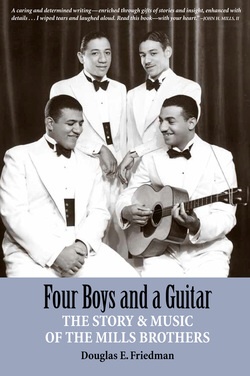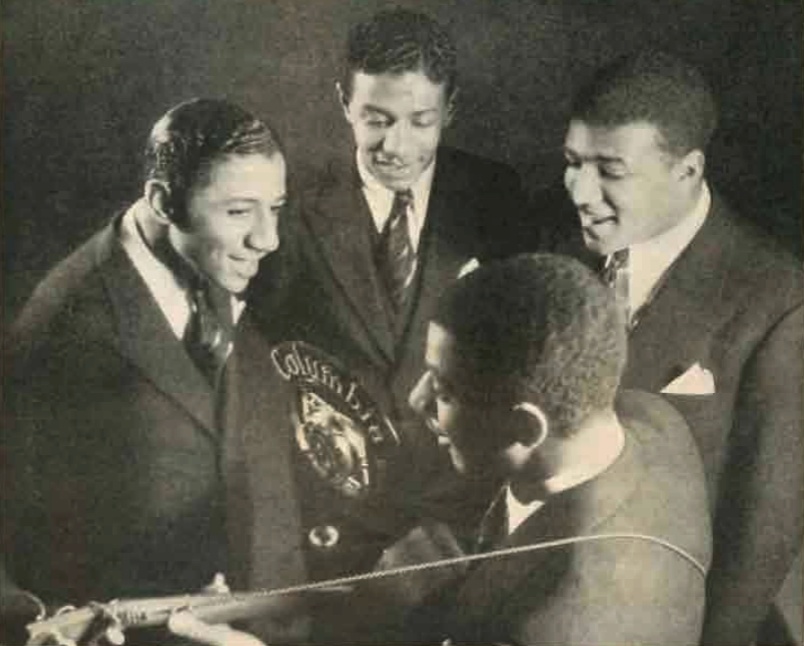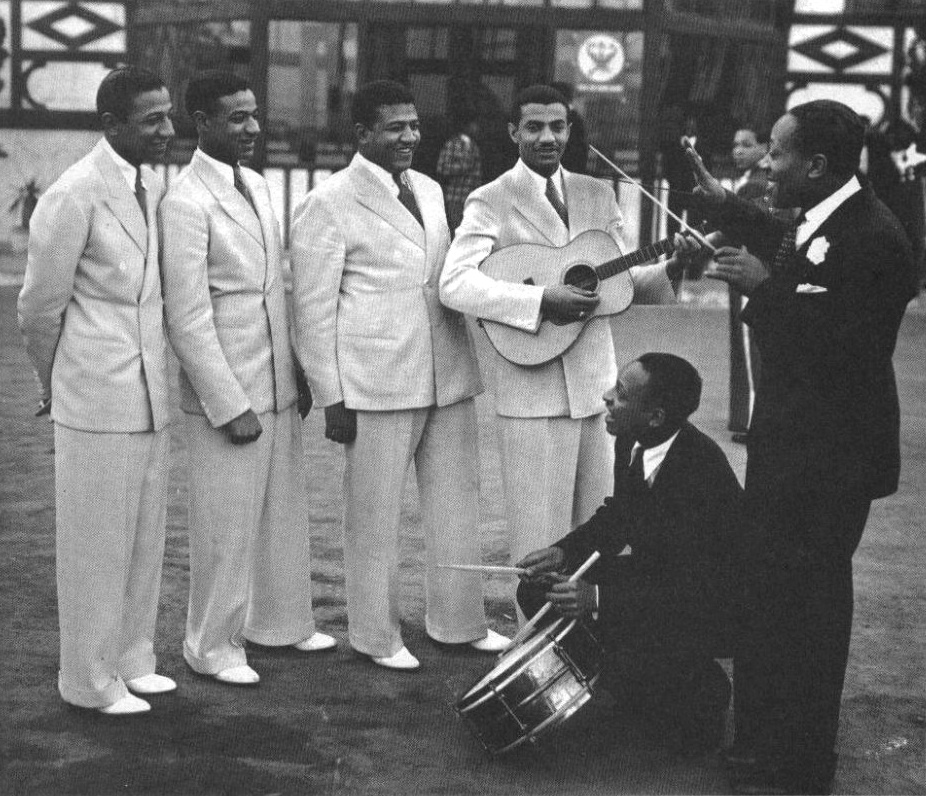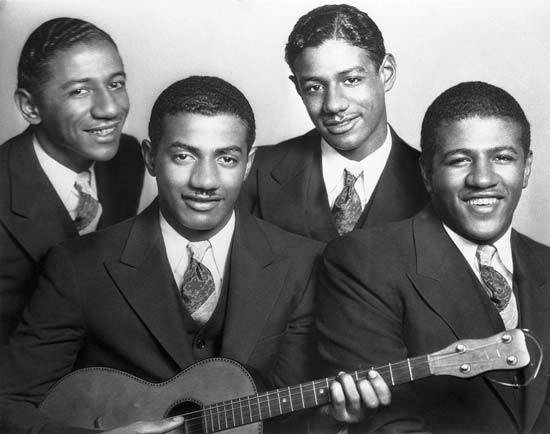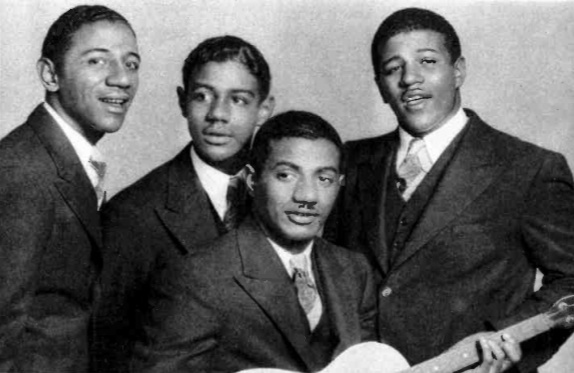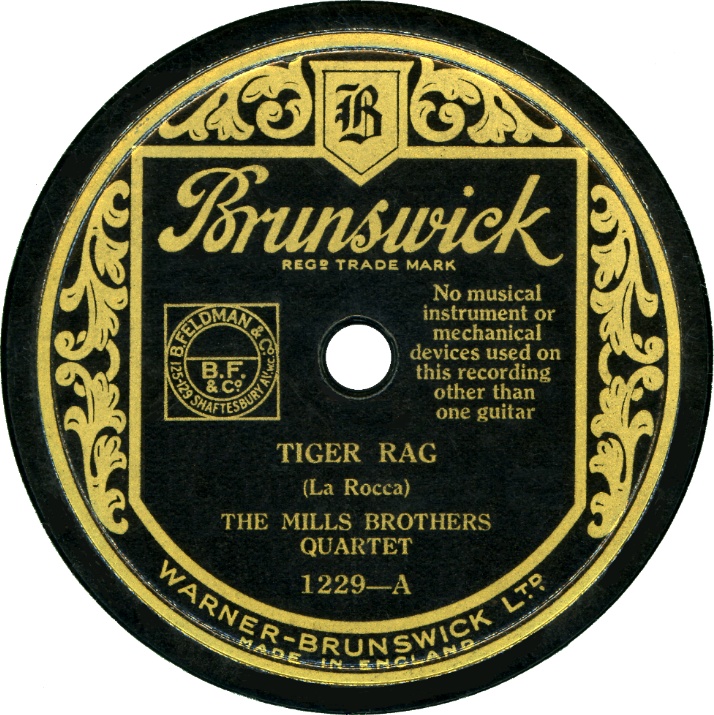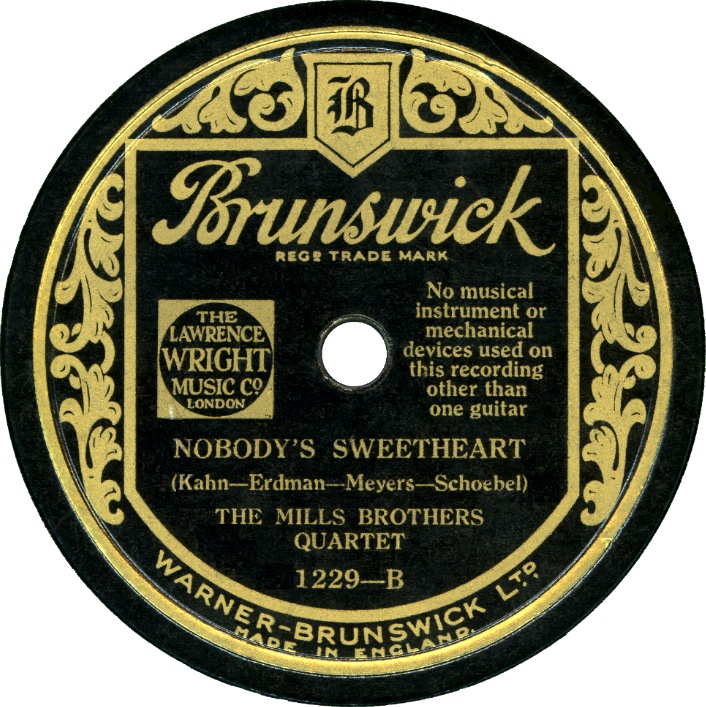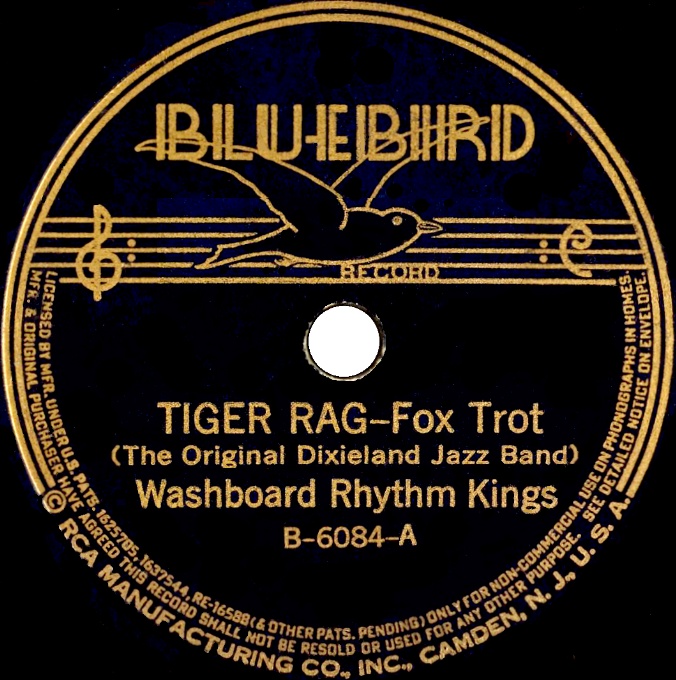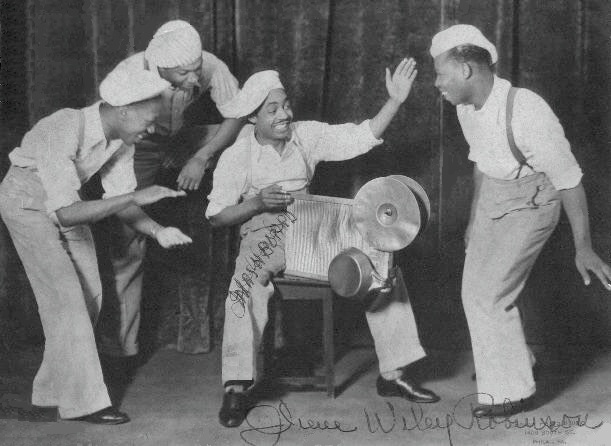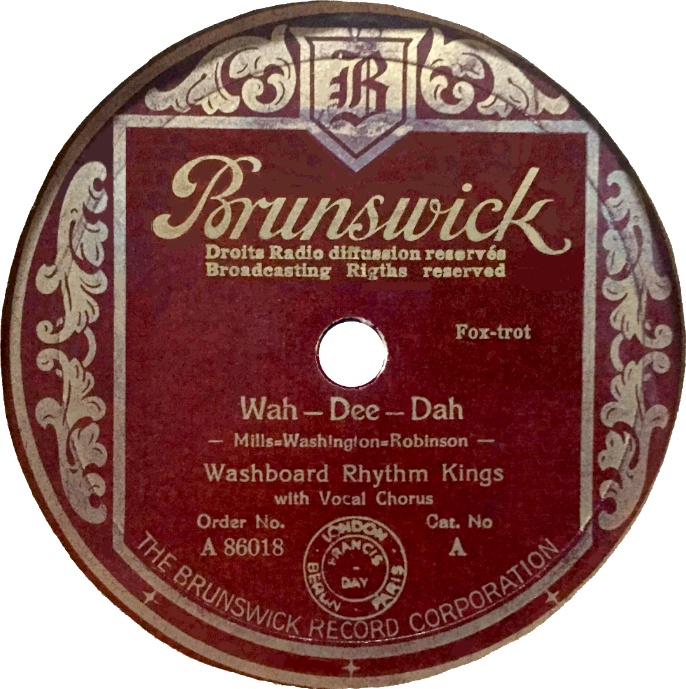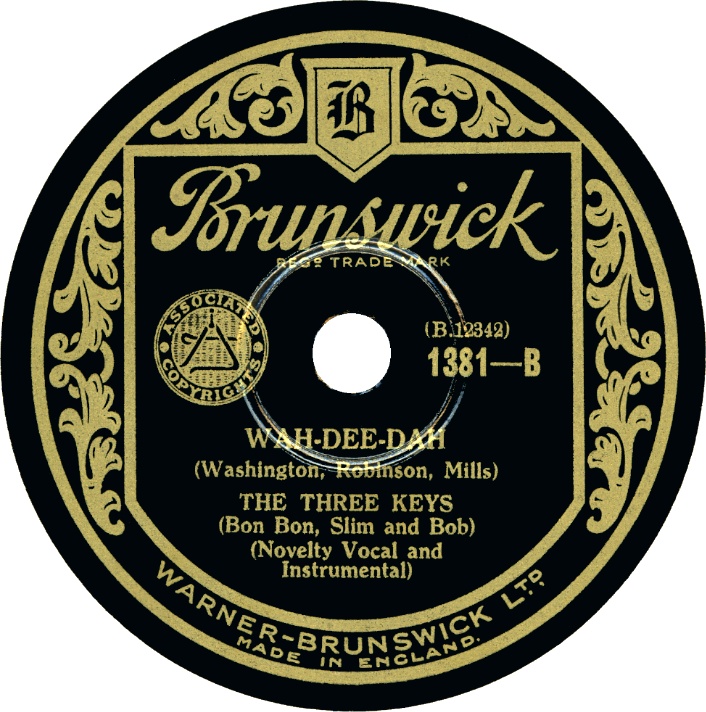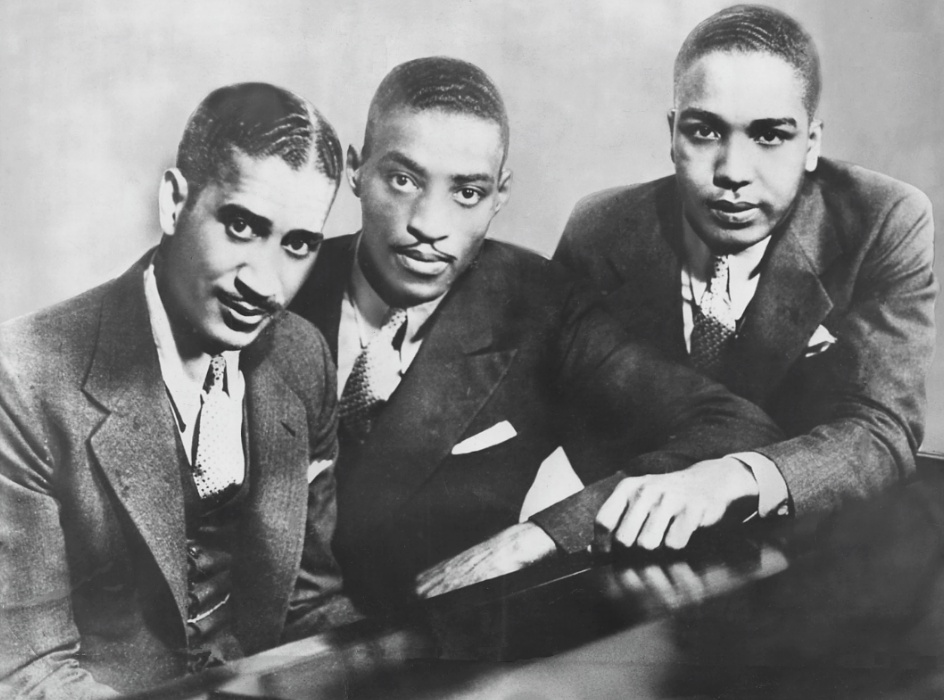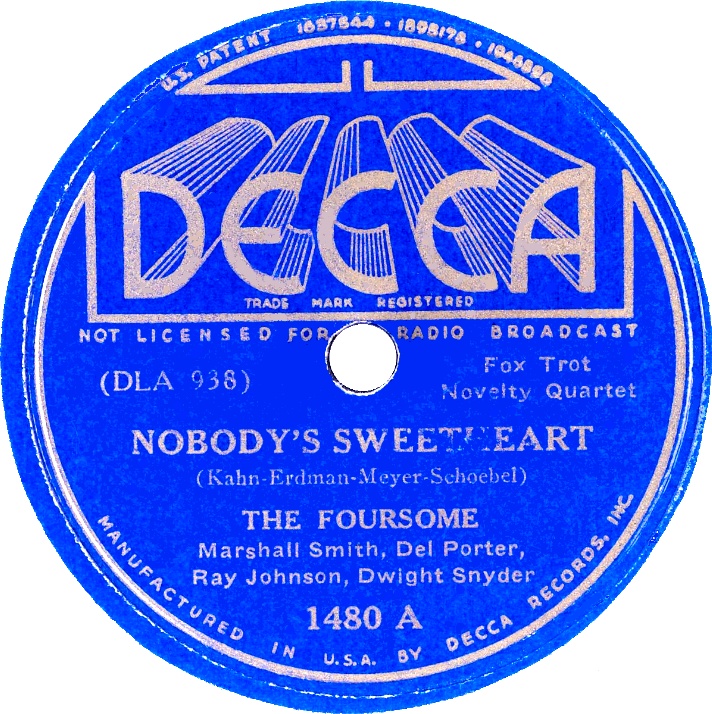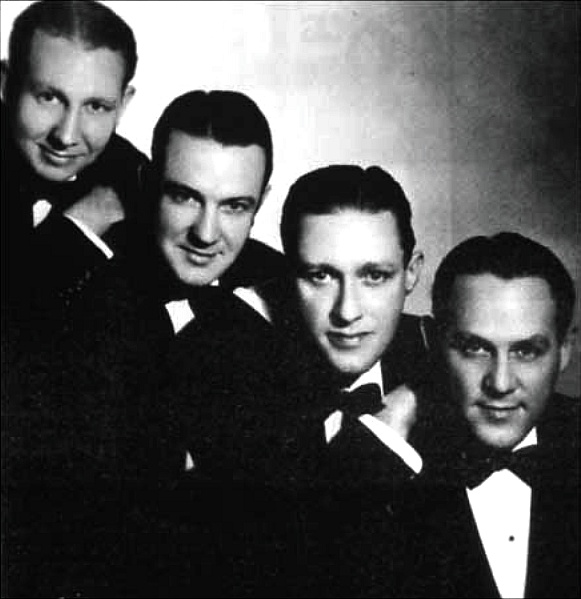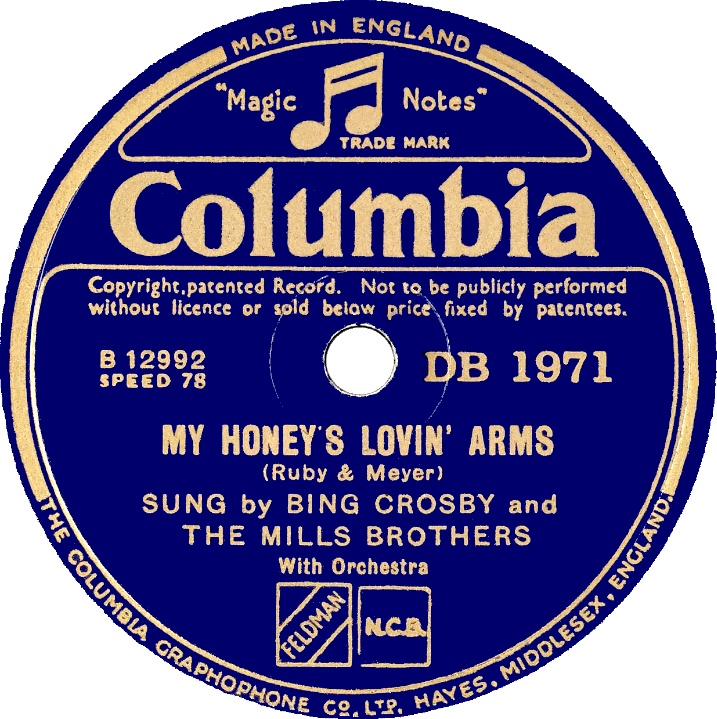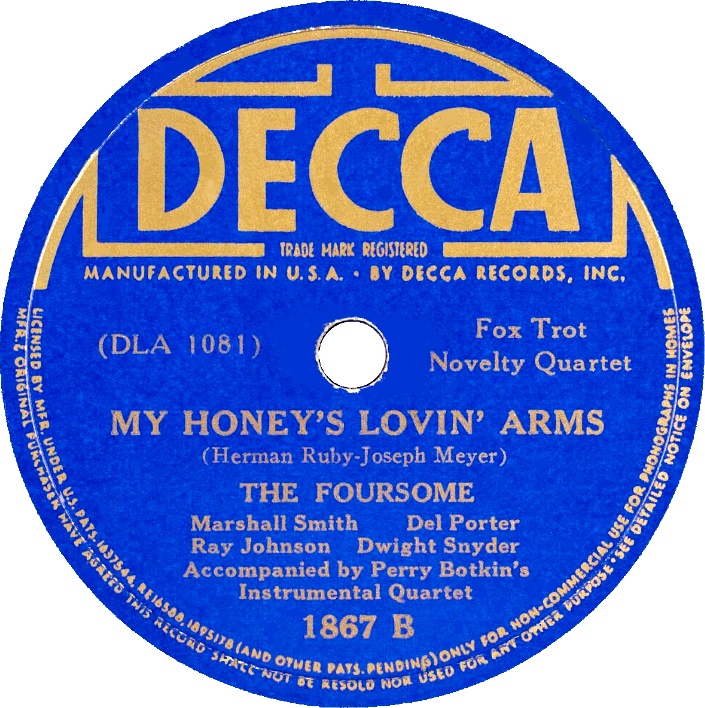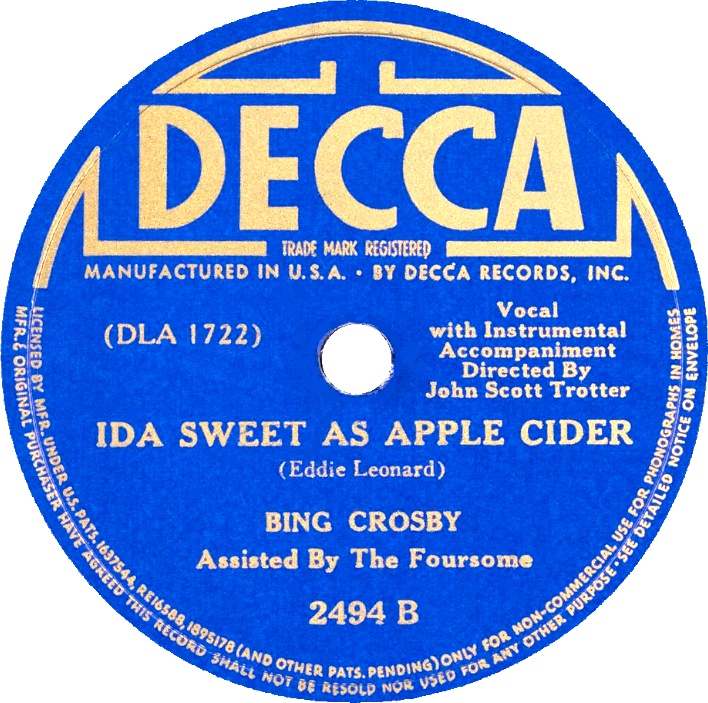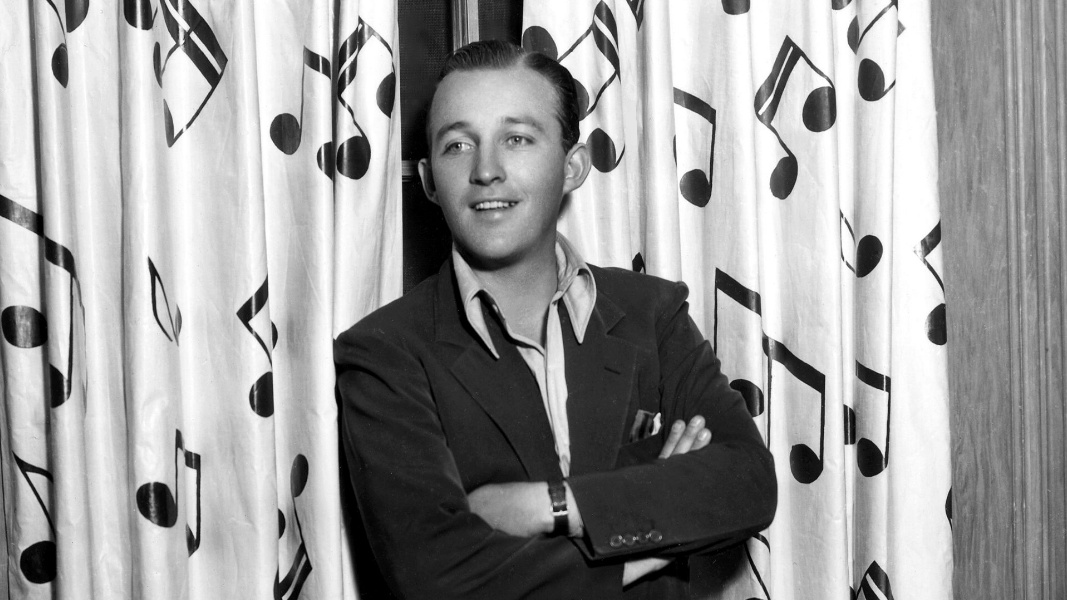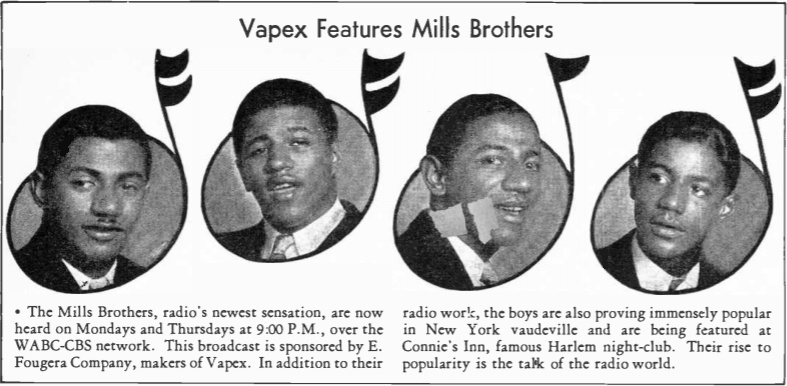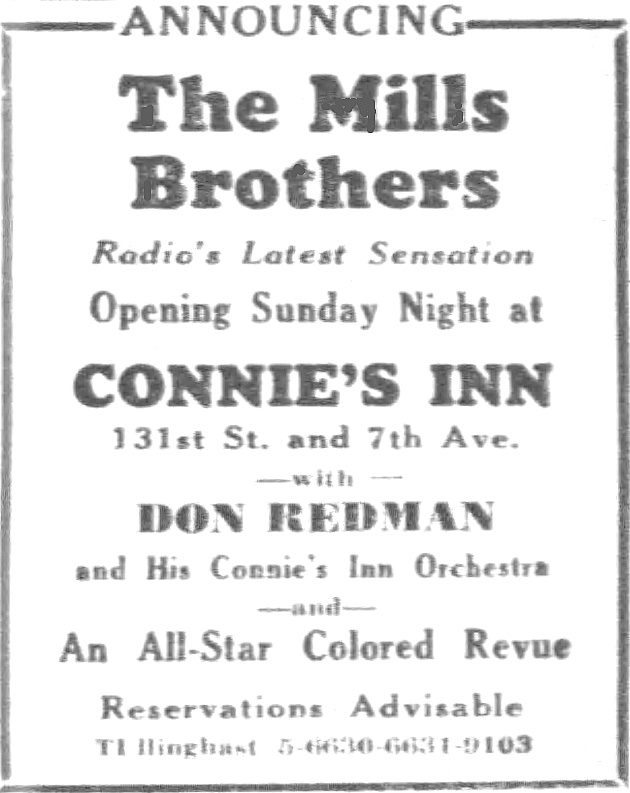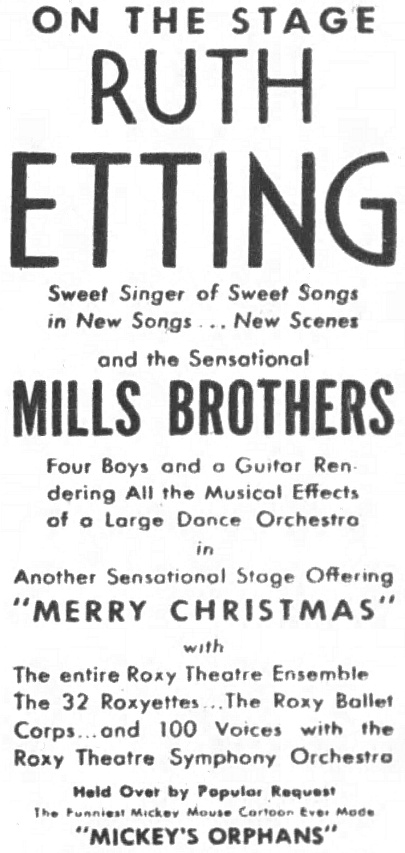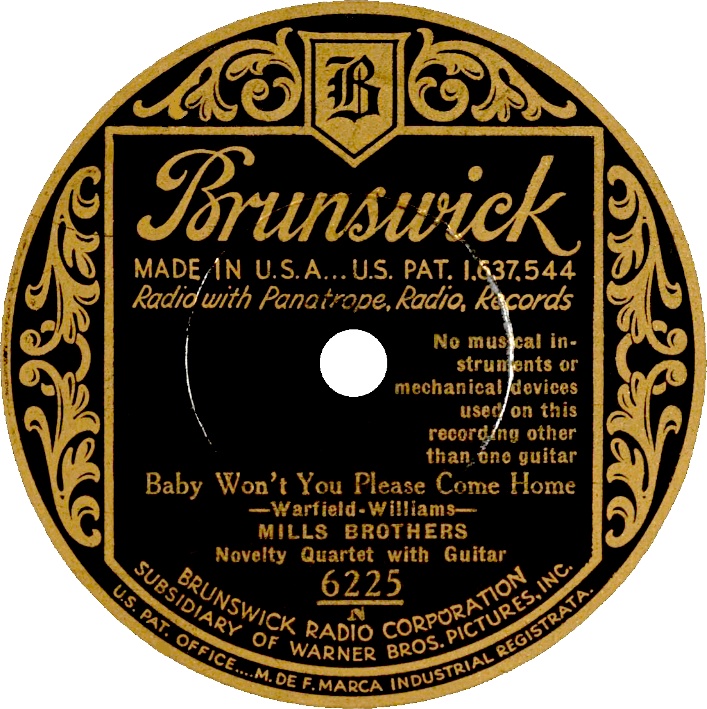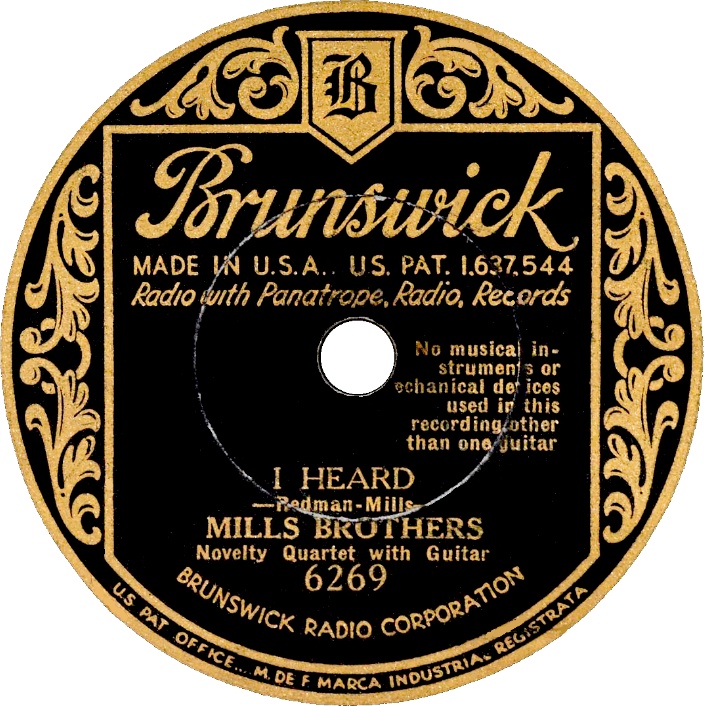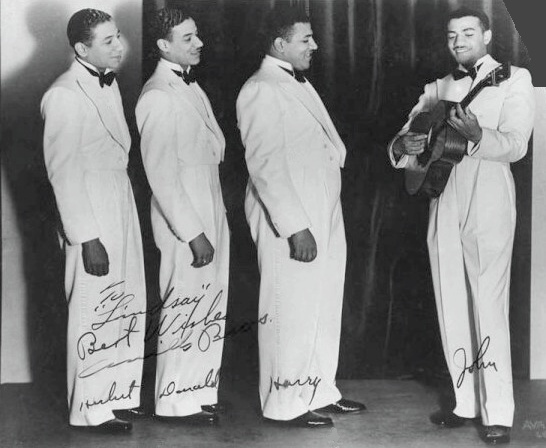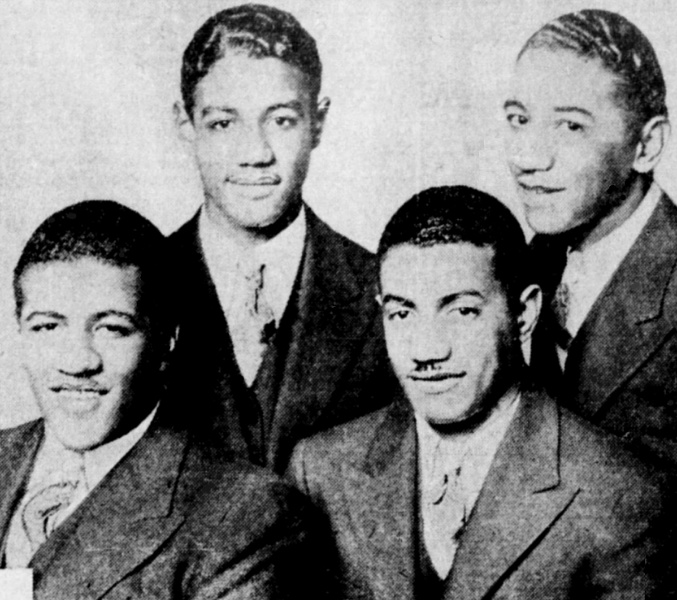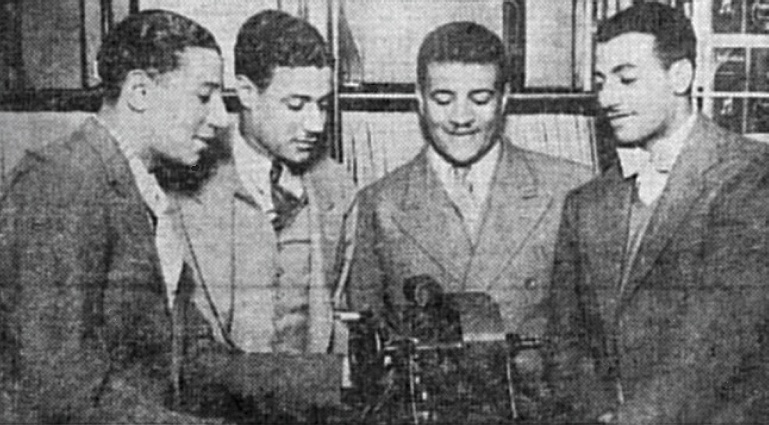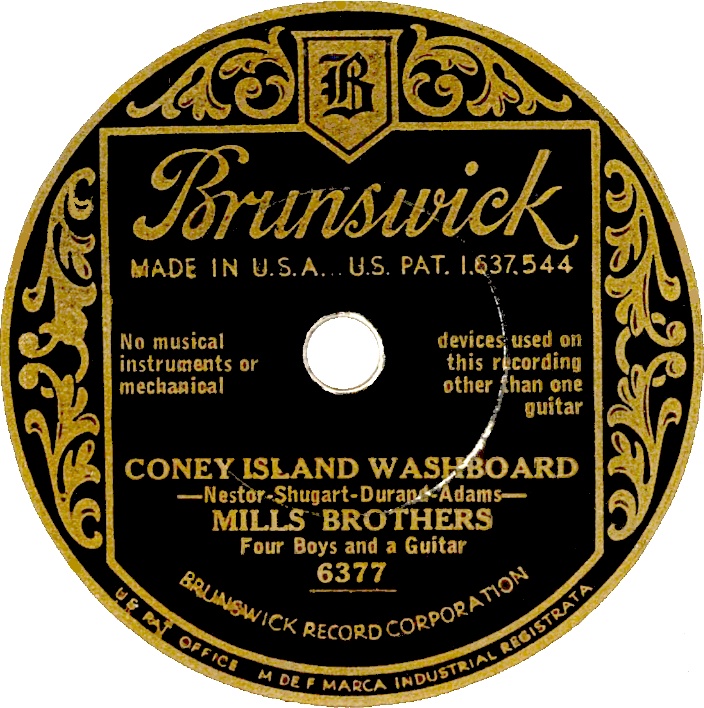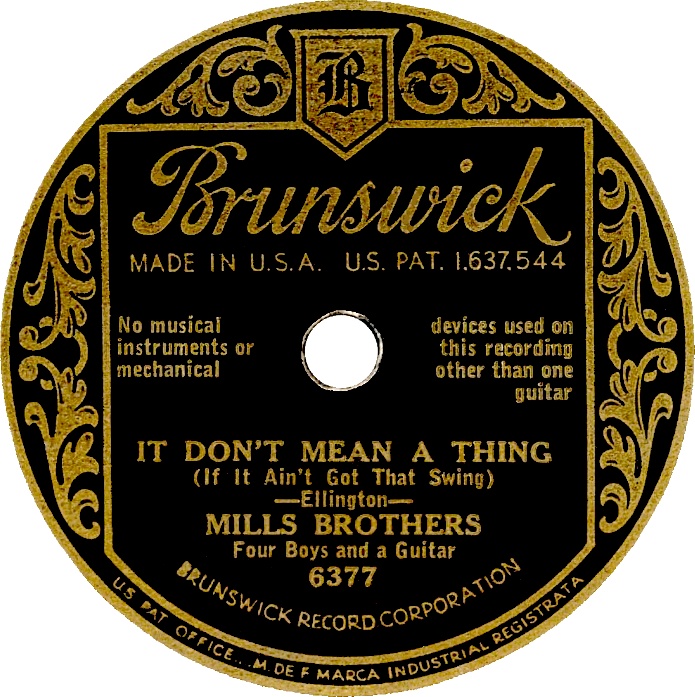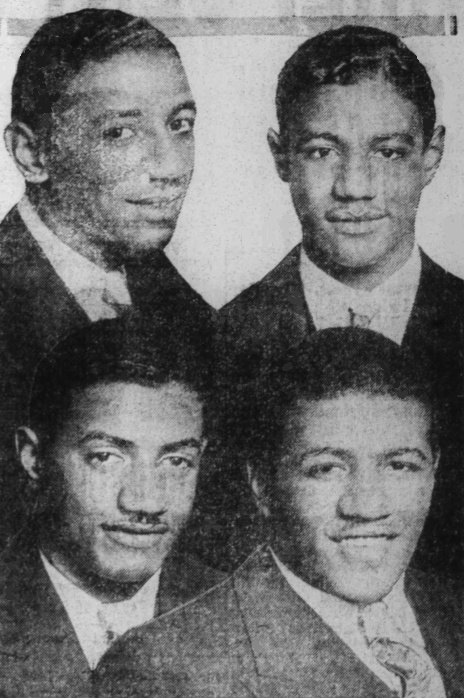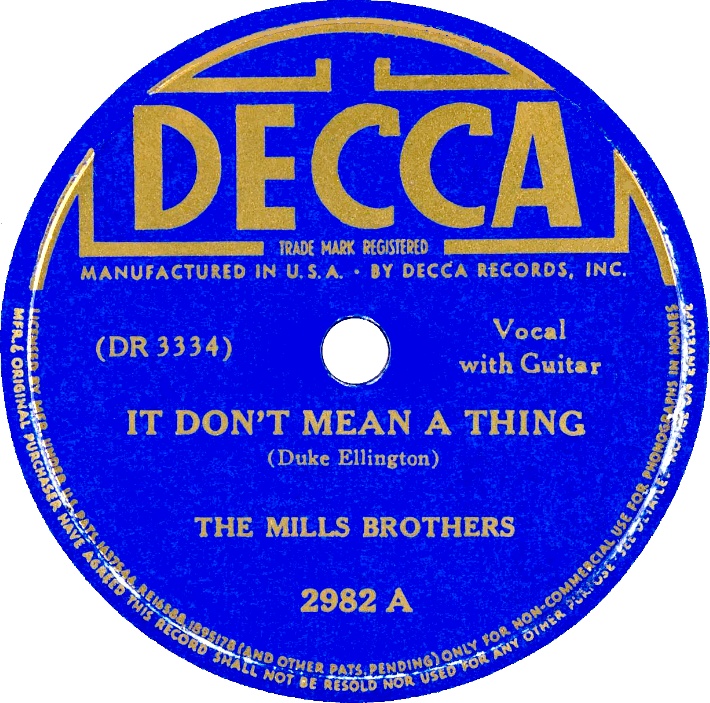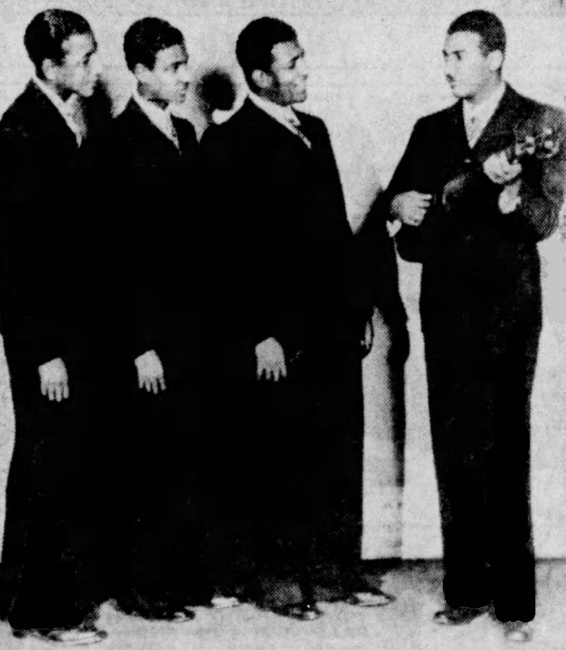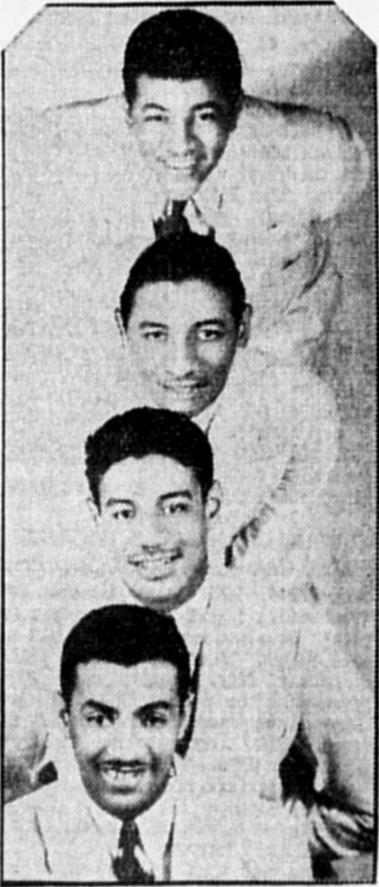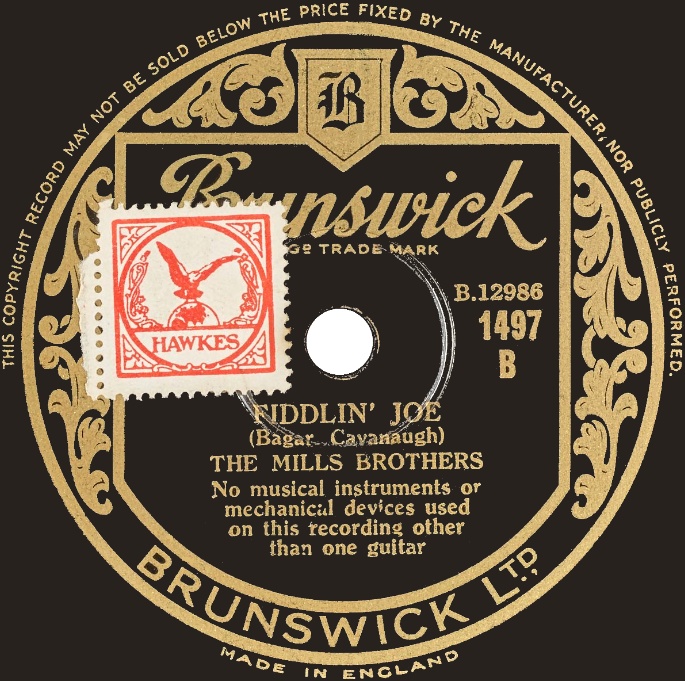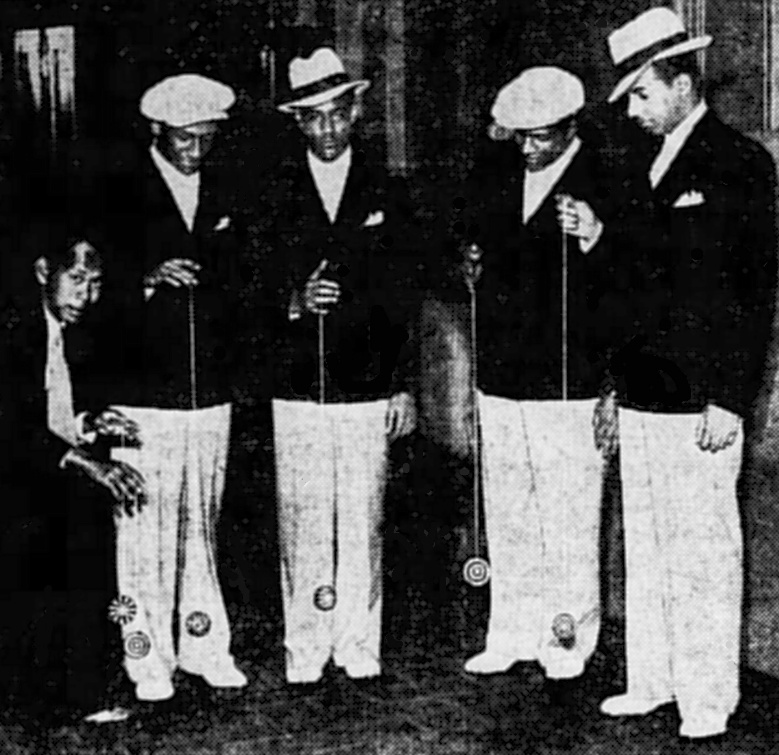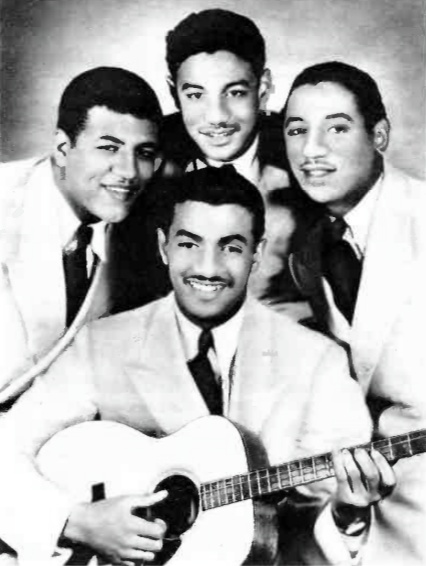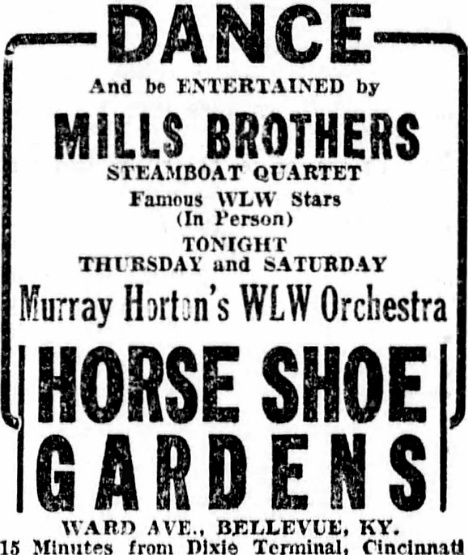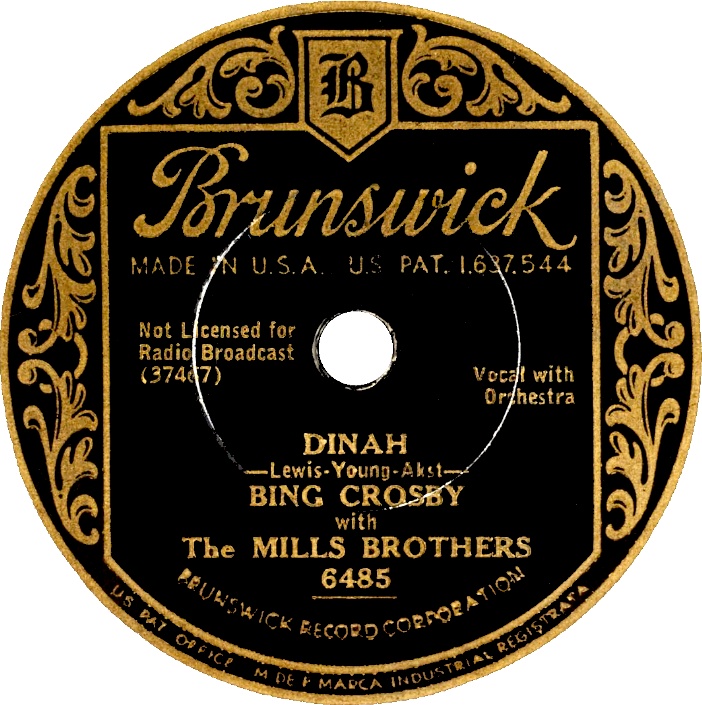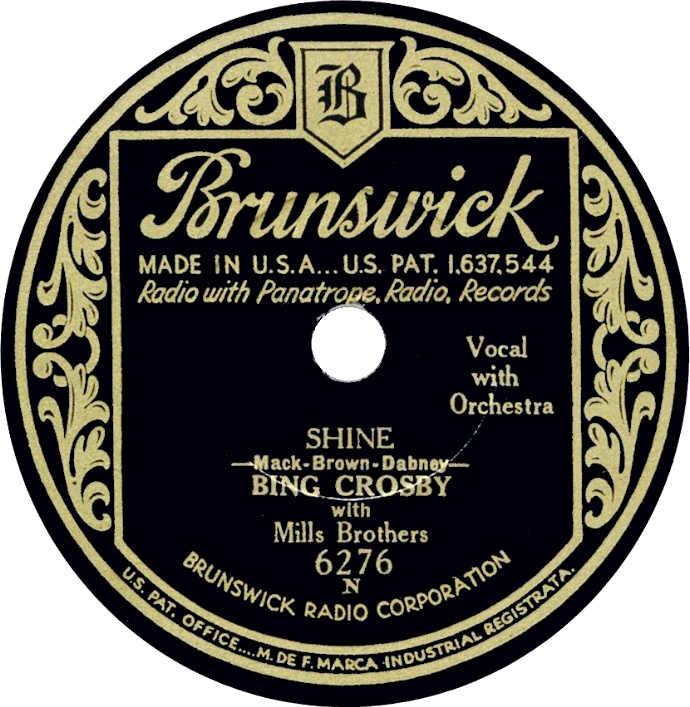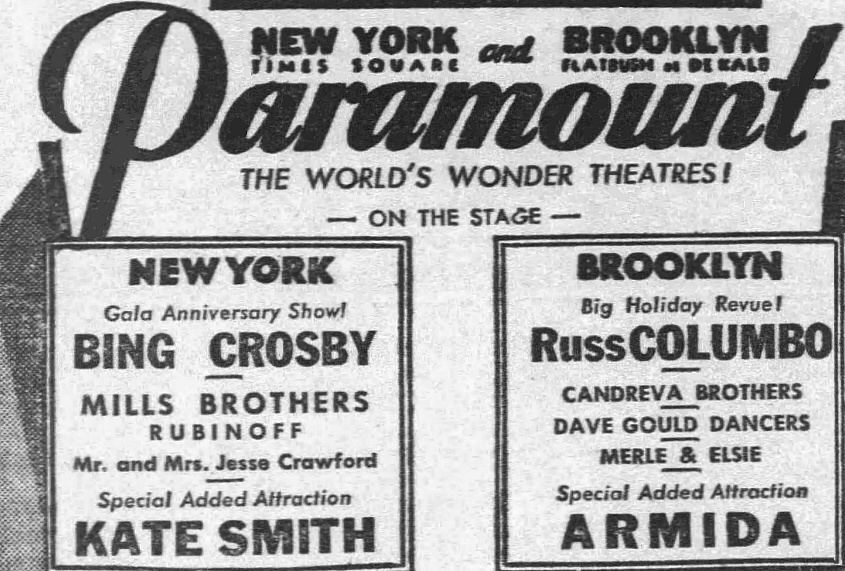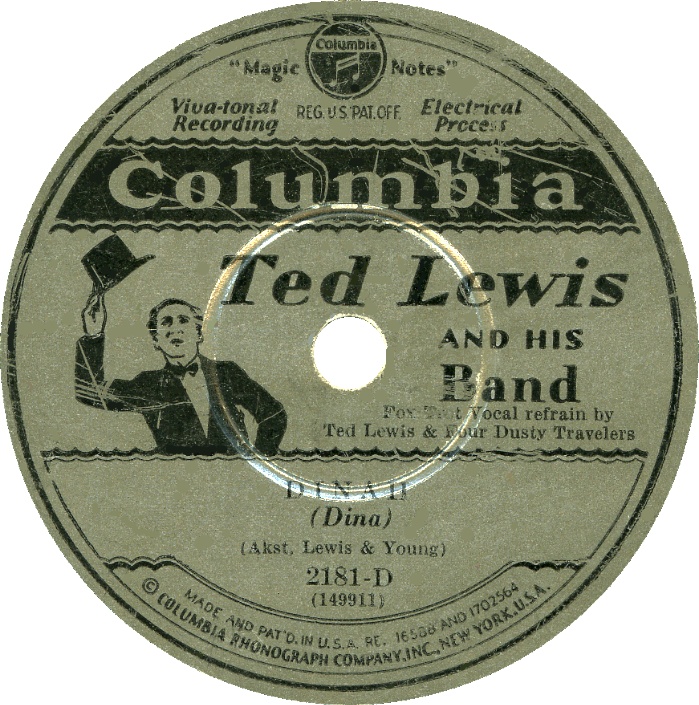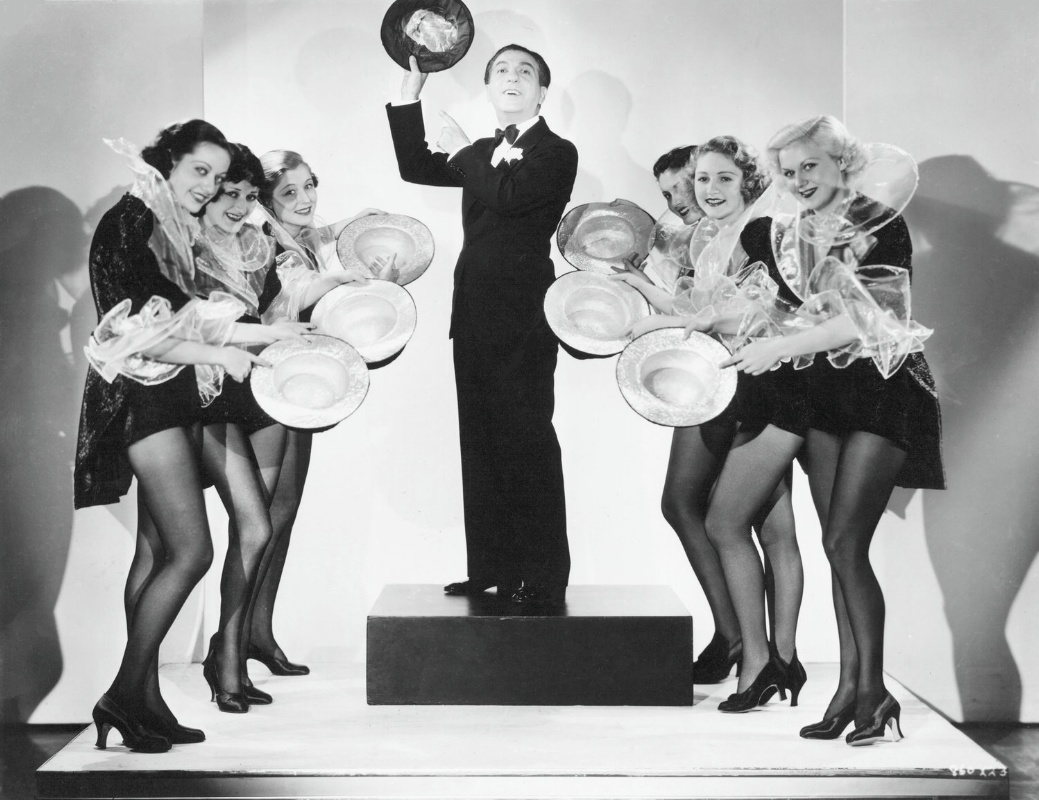|
ARTICLES AND BLURBS....
THE TIMES, November 3, 1931: FOUR MILLS BROTHERS, BIG-TIME HIT; "ORCHESTRA" WITH ONLY ONE GUITAR
....(The Mills Brothers) were born in Piqua, Ohio. Their father and mother sang in vaudeville, at intervals. The boys began singing together when John was 13 and Donald 9, and they picked up odd nickels performing in the street. Then the father decided to set them up as entertainers in his barbershop—and all thrived.
After a while, when they caught the idea of their unique "instrumental" harmony, they got an engagement in the local opera house. They netted $120 in three nights.
In 1926, the Mills family moved to Bellefontaine (Ohio). The boys started in school but had to quit to earn money and Harry became a boot-black, John worked in a greenhouse, Herbert turned hod-carrier, while Don was allowed to take it easy. Between times they entertained at socials and smokers.
Then to Cincinnati where they won a place on a radio station, soon appearing on 13 programs weekly. Theater engagements came to them, in vaudeville and movie houses. By this time they could sing from memory 130 numbers. And now in New York—and the big time. The Mills Brothers. Count 'em. And remember them.
PIQUA DAILY CALL, November 14, 1931: LARGE NEWSPAPERS COMMENT UPON THE ABILITY AND RISE OF LOCAL RADIO STARS
That The Mills Brothers, formerly of this city and now "big time" in radio, continue to make good is indicated in these two following clippings taken from large newspapers. The clippings were sent to local friends by the brothers. The first appeared in the Detroit, Michigan, Daily Mirror on October 29th and was written by Viola Brownlow, radio editor.
"It's a big success, this ninth annual convention of radio announcers here this week. Wish you could have seen those radioites do their stuff. The Mills Brothers all but tore down the walls of The Statler".
This following article was taken from the Washington, D. C., Post of October 31.
"Quite another sensation has been that of The Mills Brothers, four Negroes from Piqua, Ohio, age 17 to 21, heard over WMAL, who are accompanied only by a guitar, but due to their ability to imitate musical instruments sound as if they had a whole jazz orchestra with them....
RADIO DIGEST MAGAZINE, December 1931: CRITICS DECLARE MILLS BROTHERS QUARTET MOST POULAR FIND
It doesn't make any difference who you are, or what color of skin the good Lord gave you, if you've got something new and pleasing as it comes through a radio receiver you are in demand. There is no bar sinister before the microphone.
But Mother Mills wasn't entirely sure about this as she proudly surveyed her four big boys down in Cincinnati. She knew something about show business. She knew a whole lot about harmony. And these four strapping black brothers were born with harmony all matched and bred in the bone for each other. "You've got something there", said a friendly radio director to Mrs. Mills. "But you'd better take them to New York if you want them to get national recognition".
Goodness to gracious, how was she ever going to get those boys to New York. But she did. And one day they meandered into the Columbia Broadcasting System studios and humbly waited for an audition. Following is the story as Mr. Robert S. Taplinger related it to Radio Digest.
At first no one gave them any particular attention, and they stood around in the reception room of the 19th floor for more than a half-hour. The reception clerk thought they were applicants for jobs as porters, and they could have been except that one carried a small and shabby-looking guitar. Finally, their presence was brought to the notice of Ralph Wonders, director of the artist division. They said they were The Mills Brothers from Cincinnati. They also said they sang together. Wonders took them into a studio, and there they harmonized for him. But they did only one number—Wonders didn't wait to hear the second. He rushed them into a studio which was sending an orchestra audition to the private office of William S. Paley, president of Colombia.
"With your permission, Mr. Paley, Wonders said, "I'd like you to hear The Mills Brothers". With that brief introduction, he signaled to the somewhat startled boys to sing. They did, and so delighted was the executive with their unique vocal renditions that he sent word to Wonders to have them continue. And for more than an hour the four went from one song to another, dozens of them all together. Three days later they were scheduled for their first broadcast. There was no advanced ballyhoo. Not a line of print, other than the bare program listing, heralding their network debut. They went on the air "cold", but as soon as their program was half-way completed, those around the studios realized that here was the "hottest" outfit that had come to radio in many Wabash moons.
And as soon as their fifteen-minute broadcast was over, the telephone switchboard was flooded with calls from listeners. "Who are they?"... "What kind of instruments do they use?"... "How do they make themselves sound like an orchestra?"... "Where are they from?"... "When can I hear them again?" Veteran musicians and orchestra leaders refused to believe that with only their voices they could simulate such musical instruments as the tuba, clarinet, saxophone, and trombone. Yet nothing but a guitar accompanied the singing of The Mills Brothers.
Their success was immediate. Newspaper and listening public's comments stamped them as the fastest "click" in radio history. They were scheduled for four broadcasts the following week, and definite proof of their literal overnight popularity occurred when a single program was cancelled for a speech of special importance. For 45 minutes two hostesses we're busily answering hundreds of calls with assurances that The Mills Brothers would return to the air the following Monday.
The four youths, a bit bewildered by their sudden success in the big city, are really brothers, and only four years separate them. They are John, 21; Herbert, 19; Harry, 18; and Donald, 17. John is the bass, tuba, and third trumpet—that's how they call themselves—and, in addition, plays their only instrument, the guitar. This guitar, incidentally, is a mail-order model and cost $6.25 C.O.D.
Herbert plays, or rather sings, the second trumpet, saxophone, and trombone. He is more reticent than the others, and usually remains in the background while the others, particularly Harry, do the talking. Harry does the first trumpet, baritone solos, and "licks"—vernacular for unusual hot intonation. He is stout, almost to fatness, but resents being addressed as "Fats" by the other three. He would rather be called by his middle name—Flood. Young Don is the "kid" of the quartet, and he looks as though he is wearing his first pair of long pants. In truth, they are his second pair. Tho the youngest, he has the best memory for dates, names and places, and is quick to correct his brothers whenever he deems it necessary.
All the boys were born and raised in Piqua, Ohio. Before their father turned barber, he and their mother sang in vaudeville and wherever they chanced to get an engagement. The boys began singing together when John was but thirteen and Donald a mere nine. At first they performed for stray pennies, nickels, and dimes—once they received a quarter—but their father, wishing to keep them off the streets, set them up as entertainers in his barber shop. Business doubled, and the Mills were enabled to keep the hovering wolf from the door.
At the same time their three sisters also were asserting themselves musically. One played the violin, one the piano, and the third sang. Today, two are married and one is a registered nurse. The brothers are particularly emphatic about the "registered". They are quite proud of that.
Finally, the brothers graduated to an engagement in the local opera house. By this time, they had developed that unique "instrumental" harmony which happened quite by accident. John, who just about blew his way along with the trumpet, was offered a job playing the horn in a local colored boy's band. Not having one of his own, he tried to borrow one, but failed. It required money to buy a trumpet, and he had none. So he offered to imitate the instrument in the band, for the night's engagement for only half pay. He didn't get the job, but it gave him an idea.
That idea he took to his brothers and they each picked out several instruments and listened closely to every orchestra they heard in order to perfect their effects. The three nights they appeared at the opera house, it rained continuously and heavily, but the place was jammed to the doors at all performances. Each was paid $10 a night, making a total of $120 for the Mills' coffers. Afterward, the family moved to Bellefontaine, and there the youngsters resumed their "readin', writin', and 'rithmetic". John and Herbert were freshman in high school, and the two younger boys were now in the eighth grade. John played football and Herbert starred on the track.
Financially speaking, matters weren't so good with the Mills family, and the boys found it necessary to quit school and seek work. That was in 1926. Harry became a boot-black, John tended flowers in a greenhouse, and Herbert turned hod-carrier. But John didn't search very strenuously for work—in fact, several times when it almost overtook him, he ran the other way. He preferred to sit at home and watch the others bring home the pay envelopes. At first, the other three objected, but then their mother reminded them that Don was the youngster, and too much shouldn't be expected of him.
All the while they were appearing at various smokers, social, and other entertainments. Then last year they moved to Cincinnati where they immediately won a place on WLW, the Crosley 50,000 watt station. Soon they were appearing on 13 programs weekly, of which four were commercials. Also came theater engagements, both in vaudeville and movie houses. They learned more and more songs, and in time they could sing from memory more than 130 numbers. And as they require almost two hours to arrange and memorize a tune, it kept them continuously busy.
When it was suggested that they make a bid for the "big time" broadcasting in New York, they were a bit dubious as to how they would be received. Then too, they didn't want to leave their Cincinnati home, but finally it was decided they would venture East only if their mother accompanied them. She consented, and to New York and Columbia they came, they sang, and they conquered. Harry and Don like New York immensely. John and Herbert prefer Cincinnati. John and Herbert left their girls in Cincinnati.
PIQUA DAILY CALL, December 31, 1931: MILLS BROTHERS TO MAKE SCREEN SONGS
(NOTE: "Screen Songs" is the name of a series of animated cartoons produced at the Fleischer Studios and distributed by Paramount Pictures between 1929 and 1938.)
It's a dull day that brings no news of fresh worlds conquered by The Mills Brothers and the latest word from this famous quartet fills a full-page advertisement in the most recent issue of Motion Picture Herald, the monthly trade magazine formed by the merger between Exhibitors Herald-World and Motion Picture News. This latest news is to the effect that The Mills Brothers are signed to make three screen songs the first of which will be "I Ain't Got Nobody".
"Radio's most popular entertainers now starring in Paramount screen songs" is the way the advertisement describes these well-known boys from Piqua, continuing "Everywhere they're asking 'Have you heard the Mills Brothers?' Without a doubt the greatest broadcast on the air today!.... The outstanding popularity of these boys, combined with the clever showmanship of Max Fleischer Cartoons give you a series of single reel attractions that can't be beaten for audience appeal".
Undoubtedly, as soon as these reels are made, Schine's Theatres in Piqua will show them to the many interested friends who are following the meteoric career of these boys to Broadway stardom.
DETROIT FREE PRESS, May 21, 1932: MILLS BROTHERS' HOT-CHA PROVES PUZZLE TO SCIENCE
Father John Mills ran a barber shop in Piqua, Ohio, and thought he had a big week when he cleared $22 net. Sons John Jr., Herbert, Harry, and Don—the four Mills Brothers—get two hundred times that from vaudeville, records, and radio. The turning point was when John Jr. learned to imitate a tuba, he taught the others how to make sounds like instruments, and they got so good that some people still think the broadcasting company is fooling when it says the only real instrument used is a guitar.
A disjointed world which runs soup lines for skilled workmen but remains enamored of gentlemen who plays tunes on saws, allow themselves to be shot out of guns, or imitate tubas, now pays the Mills boys $5,000 a week. Father John is not entirely pleased. The change in finances is fine—more money in a week than he could make in three years of shaves and singes—but he also taught the boys some spirituals, and they haven't been able to sing them of late because the public demands that they imitate saxes and tubas and when the boys have tried to make up accompaniment to go with the spirituals, the result has been pretty sour.
....John Jr. used to pretend it was a professional secret how he did the tuba imitation. He wouldn't tell how he did it. Doctors say he's structurally abnormal, probably. Even musical experts do not know how he does it. "Neither do I", admitted John Jr. Friday.
John Jr., incidentally, played first base and pitched for the Piqua Marcos, a colored baseball team, and Herb was shortstop. Both were halfbacks, too, on a Bellefontaine football team.... In New York they live in Harlem. They hired a negro boy, Tom Levine, in New York, when they overslept for several performances at the Paramount Theater. His only job is to get them up, so they won't miss an engagement. Many mornings they wish he was in hell.
They have three sisters. Two live in New York, and one is a trained nurse. None of the girls ever went in for entertaining professionally. One of them is not so much impressed with the life the brothers live. "You can't lie in bed mornings", she taunted once when Herbert mentioned the money the act was making. That stopped him. The alarm clock and It's-Time-To-Get-Up Tom Levine discolor the whole success story.
Life, in fact, was much pleasanter back in Piqua. You could sing on a street corner for pennies at any old hour, and if you didn't like the day, you could roll over and go back to sleep.
PITTSBURGH COURIER, July 16, 1932: MILLS BROTHERS RANK WITH BEST ACT
CHICAGO—The current issue of Variety publishes a statement to indicate that The Mills Brothers, at the present time, are one of the greatest headline drawing acts in the country. Comparisons are made between The Mills Brothers, Ted Lewis, Morton Downey, Bing Crosby, and Guy Lombardo. The test for each is the Paramount Theaters in four cities, New Haven, Boston, Buffalo, and Detroit.
In New Haven, The Mills Brothers Drew $20,000 in one week as against $16,000 for Ted Lewis and $14,000 for Bing Crosby.
In Boston, the four boys and a guitar attracted $40,000 for their week as against $39,000 for Ted Lewis; $29,000 for Bing Crosby; and $37,000 for Guy Lombardo.
At Buffalo, the takings for The Mills Brothers was $30,000 compared to $29,000 for Morton Downey; $22,000 for Bing Crosby; and $30,000 for Guy Lombardo.
Detroit paid $37,000 to hear The Mills Brothers; $33,000 for Ted Lewis; $29,000 for Morton Downey; $27,000 for Bing Crosby; and $38,000 for Guy Lombardo.
All of these engagements were held in March, April, and May of this year. Guy Lombardo is the closest competitor of The Mills Brothers. In three cities, Boston, Buffalo, and Detroit, The Mills Brothers attracted $107,000, while Lombardo in the same spots drew $105,000.
LOS ANGELES TIMES, July 31, 1932: REPERTOIRE OF MILLS BROTHERS HAS 300 SONGS
More than three hundred songs comprise the repertoire of the four Mills Brothers, who hold the distinction of being the most rapid "click" act in radio history.
Furthermore, they have spent a total of 600 hours just preparing those numbers for presentation, they revealed in signing with Paramount for the "real life" picture of radioland, "The Big Broadcast", in which they play parts with such other radio personalities as Bing Crosby, Kate Smith, Guy Lombardo, The Boswell Sisters, Burns and Allen, Donald Novis, Cab Calloway, and Arthur Tracy, the Street Singer.
Since they first began singing for the radio, The Mills Brothers always have spent two hours and arranging and memorizing each tune. They knew 130 songs before they reached New York.
DEMOCRAT AND CHRONICLE, September 25, 1932: QUARTET OF ENTERTAINERS JUST NATURALLY FELL INTO ENGAGEMENTS
...."How did you get started?" Harry Mills was asked. "....We came by what we have in the way of talent naturally, I guess. My mother and father were singers in vaudeville. Then my father quit, to run a barber shop out in our hometown in Ohio. We used to sing around the barbershop. Then finally we got a small engagement in vaudeville. We picked up this idea of imitating musical instruments and perfected our technique. Then we got an audition with the Columbia Broadcasting System and here we are".
They were an instantaneous hit on the radio. Besides their songs, they imitate the tuba, clarinet, saxophone, and trombone. Their singing is accompanied by a single guitar. With their success, they bought a lot of new clothes and moved to Harlem. They are more or less the leaders of the "younger set" of that section of upper New York. When they go motoring, a chauffeur in livery drive them.
The Mills Brothers have three sisters. Their parents are still alive. Mr. And Mrs. Mills, who knew only a modest stage success in their day, still can't quite realize that their four sons have become four of the most popular radio entertainers in the country.
RADIO STARS MAGAZINE, March 1933: MEET THE MILLS BOYS
Four complete success stories in one family! Four entire Alger Books rolled into one romance! Four male Cinderellas who went from rags to riches! Ladies and Gentlemen, The Mills Brothers!
....The Mills Brothers play hot harmony. And is it hot? You're asking me? If you've already read stories about them—and a lot of stories both true and untrue have been printed—you'll know that the only real instrument they play is a guitar. They simulate all the rest! I didn't believe it until I heard them myself—in person. It's true. They really do! John plays the guitar. They bought it, years ago, from a mail-order house, and it does very well, so they haven't thought of changing it for a better one. The other instruments they "play" with their voices. They can successfully imitate the clarinet, the saxophone, the trombone, and the tuba.
There is a slight legend going around that it's hard for a colored boy to make good. You know—the color line—all sorts of difficulties. But The Mills Brothers were not kept back because of their color. And, having more than slight talent, they were not taken up and spoiled because of their accomplishments. They seemed quite unspoiled, when I spoke to them, as they must have been when they left home. Though, when you come to think of it, that wasn't very long ago.
They are mere children now, The Mills Brothers. Though three of them have had birthdays since their success was assured they are still merely infants when compared to most successful people. John, the senior of the quartet, is 21. My, my, he is getting on! Herbert is 20 now. Harry—he's the fat boy—is 19, and Donald, the baby of the family, has just had his 18th birthday. ...
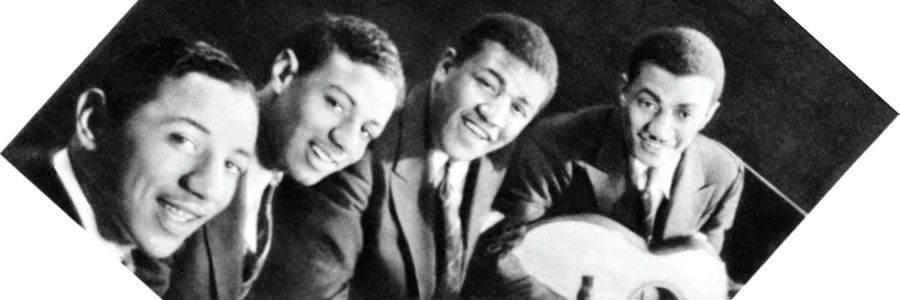
They were born in Piqua, Ohio, and they have three sisters. Their parents were jubilee singers until the babies came. You can't travel around and sing with seven babies to look after! So Papa Mills took a job as a barber. And a colored barber in Piqua, Ohio, even if he is a good colored barber, doesn't make a lot of money. But he worked hard. And pretty soon he had his own barber shop. And even then it was pretty hard going with nine mouths to feed. Papa Mills is still a barber. He's in Philadelphia now. And it's a good sign, it seems to me, for Papa still to be working after the boys have made good. Two sisters are married and the third is a registered trained nurse.
Even when the boys were little they liked to sing. But, as John explained to me, all little colored boys like to sing. It just happened that, because there were four of them, they could sing together and learned to sing a little better—or a little louder than the other boys. They used to sing on street corners when they were little bits of kids. Can't you see them—four very small, very eager colored boys, their little mouths closing and opening, so fast, trying so hard to make harmonies? It probably sounded pretty good even then. But the cops in Piqua, Ohio, didn't think so. And where are those cops today? Undoubtedly still chasing little colored boys off street corners. But the chasing did temporarily discourage The Mills Brothers. They sang around the house for a while after that. Barbering wasn't so profitable in Piqua, so the family moved to Bellefontaine. The boys were in school then and they kept on going to school in Bellefontaine. And then finances grew more stringent and they had to go to work. John was a sophomore in High School then. The others quit before they reached High School.
There aren't many things that young colored boys in a small town can do. But they weren't lazy—that is, none but Donald—and he was such a little boy! They all found jobs. John tended flowers in a greenhouse. Then he was a janitor in a bank. Harry was a boot-black. Of course! Doesn't one have to be a boot-black to make this a proper success story? There were dozens of other jobs. It takes a lot of working to buy enough groceries for so many young hungry mouths.
Then one of the boys thought of singing. Publicly, that is. Without the benefit of cops on the corner. So they rehearsed some songs, singing them straight as a quartet and got some engagements. Not many, but a few. Just a quartet of young colored boys trying awfully hard.
But they had something. And, pretty soon they began putting in little original bits—and then they weren't just a straight quartet anymore. Harry had been playing on a kazoo—don't ask me what a kazoo is. John told me about it—and one night he forgot it and imitated one instead. And, except for the faithful guitar, that was the end of the "real" instruments. The audience liked the simulated kazoo far better than they had liked the real one. Pretty soon, imitations of trombones and tubas had began to appear—and the boys' engagements at smokers and socials grew in number and importance.
Then Martin Bower gave the boys a chance to appear at May's Opera House in Piqua at an American Legion entertainment. That was their first big chance. And did they make good? One guess now. They got another "opera house" engagement after that. And, before they knew it, they were playing vaudeville houses. Then came a chance at the radio—a local Cincinnati station. And they went over something grand.
They were a little bit doubtful about coming to New York for an audition. But they finally did come. That big thing called "influence", which you've heard so much about, was absent entirely. They got an audition. And three days later they were scheduled for their first broadcast. They went on cold, without a line of publicity or advance notice. And, immediately the telephone began to ring. What about that quartet? Who were The Mills Brothers? And The Mills Brothers were made—as far as radio success goes.
They are still young and eager. Still a bit more Piqua, Ohio, then New York City, though they're getting along very nicely in New York, if you ask me. They've learned to dress in the accepted New York fashion for colored boys who have made good in radio. But they send their money to their mother and she saves it for them. They haven't a new car now. They travel so much that they find it more convenient to depend on rented cars. They have a valet, but, after all, when you have to make changes in vaudeville—and all those new clothes to be taken care of.
...Then, this year, they have gone in extensively for sports. John likes golf. Herb and Harry like golf too, but prefer tennis and horseback. Donald, while he's interested in nearly every out-of-door game, prefers polo. He doesn't want to live, in the summer, very far from a good polo field. And, if things keep on, there's no reason why he'll ever have to. From boot-black to tennis player. From window washing to golf. From Piqua, Ohio, to polo. From being chased by the cops on the corner to—but I really can't spend any more time at the typewriter. Isn't this the night The Mills Brothers are on the radio?
STAR TRIBUNE, December 3, 1933: MILLS BROTHERS CHOIR SINGERS A FEW YEARS AGO
It was not long ago in the town of Piqua, Ohio, that The Mills Brothers sang every Sunday in the church choir. Aside from their vocal labors they were employed in various and widely different occupations. Their daily stint was only an added effort to keep the wolf from the door.
John held the position of bank clerk and janitor. Herbert was then the only apprentice barber who could clip the patrons here in rhythm. He gained quite a following with this feat. Harry Mills donated to the family expense account by shining shoes. He could beat a perfect tattoo on the shoes of his patrons and in time learned to beat a syncopated rhumba with the brushes and the shoe rag. Harry got a job as a barker in front of a parking space. Here he cultivated his voice by singing instead of shouting. Donald, the youngest, was then being sought by the truant officers. He much preferred to be with his brothers than with his teachers.
Their daytime occupations were only to keep meat on the table, but in the evenings they would practice singing. The harmonies they used were original and their rhythm was of the primitive sort. Music was second nature to them.
The audiences attending the State Theater this week will see for themselves that The Mills Brothers imitate various instruments by using only their lips and hands. The guitar is the only instrument employed. It is the same guitar they bought from a large mail-order house several years ago. Among the instruments they so successfully imitate are the tuba, saxophone, clarinet, trombone, bassoon, and oboe.
|
